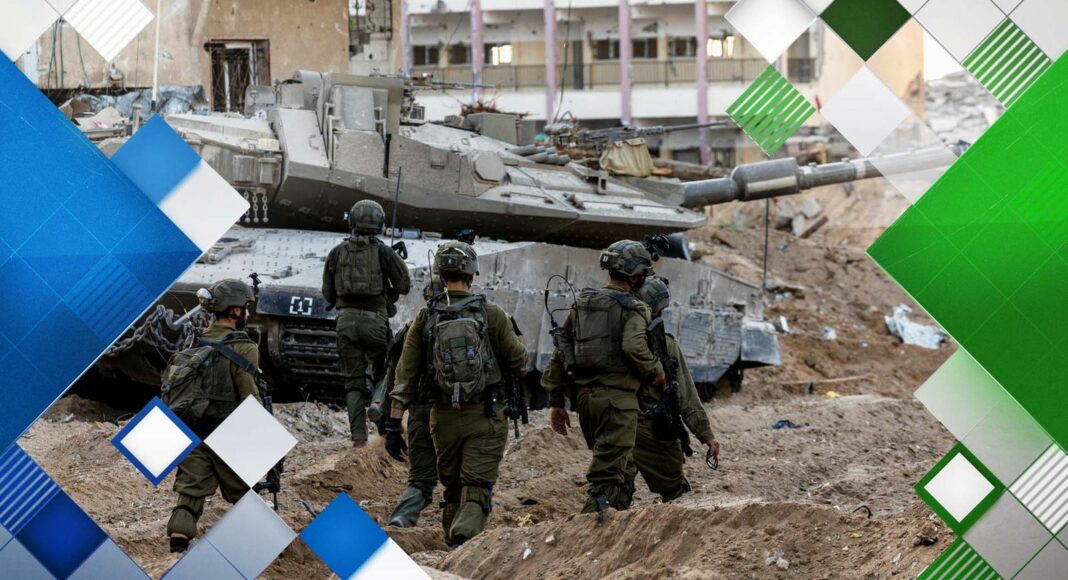As the humanitarian crisis in Gaza escalates and the number of Palestinian civilian casualties climbs, what is Israel seeking to achieve with its military response to the Hamas attacks?
Conducting an effective joint (air, land and maritime) military offensive campaign requires considerable planning and preparation.
Although the Israeli political objective of “destroying Hamas” creates an interesting soundbite, as a practical and achievable military objective it lacks credibility – the military cannot destroy an ideology. Regardless, Israel has declared war on Hamas, and appears determined to “resolve the Hamas issue” whatever the cost.
Israel-Gaza latest: Explosions and ‘intense clashes’ reported at Gaza hospital
0:38
IDF fights Hamas in Gaza
But to what end?
With the ground offensive on Gaza City under way, the residents have been told to leave northern Gaza for sanctuary in the south. However, for many Palestinian civilians that is not a credible option; besides, the IDF is also bombing the south of Gaza, so despite the risks, many have stayed in Gaza City.
Prime Minister Benjamin Netanyahu appears to have his sights set on seizing Gaza City.
Despite Hamas resistance, there is a certain air of inevitability that – eventually – the IDF will achieve that objective, even though it will prove extremely difficult to stop Hamas from subsequently continuing to launch surprise attacks from the Gaza Metro (the extensive labyrinth of tunnels under Gaza City).
Hamas is no match for the Israeli military, but Hamas can deny Israel the opportunity to achieve its objective by simply relocating many of its fighters to southern Gaza, where they can blend in with the locals and “live to fight another day”.
Image:
Israeli soldiers operate amid the ongoing ground invasion against Hamas
Image:
Israeli military vehicles move along a road at Israel’s border with Gaza
What next?
Before the conflict, the unemployment rate in Gaza was around 50%, and decades of economic decline had left a bleak outlook for the region. Now, devastation has been wreaked on the Gaza City infrastructure, thus further eroding the prospects for those residents returning after the conflict ends.
And, although the mounting casualties resulting from IDF military action look alarming, experience suggests that these current figures will ultimately be dwarfed by deaths resulting from disease, lack of water and medicines.
Although mounting international diplomatic pressure continues to call for some form of ceasefire, what influence does the international community actually have in this conflict?
Is there any political appetite – and resolve – to find an enduring solution to the conflict, or will the international community once again be content to apply a well-intentioned sticking plaster to curtail the current conflict, only for it to erupt again in the not-too-distant future?
Read more:Palestinians stream onto Gaza highway as IDF strike near hospitalsIsrael to pause fighting in Gaza for four hours a day, US saysHamas leaders ‘dead men walking’ as Israel claims troops are fighting in ‘heart’ of city
1:17
Explosions seen near Gaza hospital
Is regional peace even possible?
There is no military solution to this situation, but have all possible political options been exhausted?
Given the apparent irreconcilable positions of the warring factions, peace will require determined, brave, imaginative and committed engagement from the international community – probably led by the US and Saudi Arabia.
However, successive generations have failed to commit the energy, resources and political capital to establish a path to peace, leading to the inevitable escalation in violence and destruction that have become trademarks of the conflict.
Nobody is suggesting that the path to peace is easy. It is not. However, the failure to exhaust all possible options has led inexorably to the horrors of war that we witness today. War is brutal and indiscriminate, and military veterans who have served their nation know first-hand the tragic consequences of the failure of political resolve.
Image:
Palestinians fleeing north Gaza move southward
Image:
Israeli soldiers stand amid the rubble in Gaza
In the First World War, over 20 million people died, and over 21 million were wounded. The horrific war was finally brought to an end 105 years ago this weekend. Armistice Day initially commemorated the cessation of hostilities on the Western Front of the First World War, which took effect at 11 in the morning – the “11th hour of the 11th day of the 11th month” of 1918.
Following the Second World War, Remembrance Day – held on the second Sunday of November – became the national focus to commemorate all those who lost their lives in war.
Although few veterans of the Second World War survive, Remembrance is an opportunity to pay our respects to those who made the ultimate sacrifice and reflect on the horrendous consequences that war entails.
Spreaker
This content is proed by Spreaker, which may be using cookies and other technologies.
To show you this content, we need your permission to use cookies.
You can use the buttons below to amend your preferences to enable Spreaker cookies or to allow those cookies just once.
You can change your settings at any time via the Privacy Options.
Unfortunately we have been unable to verify if you have consented to Spreaker cookies.
To view this content you can use the button below to allow Spreaker cookies for this session only.
Enable Cookies
Allow Cookies Once
Click to subscribe to the Sky News Daily wherever you get your podcasts
Politicians declare war, but the tragic and brutal consequences are felt more widely – both civilian and military.
We should never forget the horrific consequences of a failure of politics, which should serve as a stark reminder that – however difficult the road to peace – the consequences of war are far worse.
“At the going down of the sun, and in the morning, we will remember them” – Robert Laurence Binyon (1869-1943)




